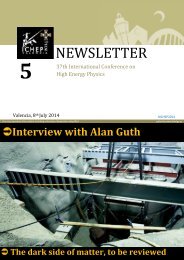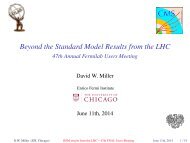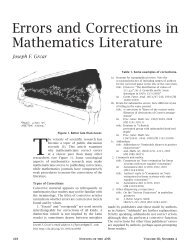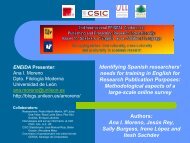PW_mar13_sample_issue
PW_mar13_sample_issue
PW_mar13_sample_issue
Create successful ePaper yourself
Turn your PDF publications into a flip-book with our unique Google optimized e-Paper software.
physicsworld.com Comment: Forum<br />
Agreeing to disagree<br />
A recent poll has highlighted<br />
physicists’ differing views over<br />
the interpretation of fundamental<br />
aspects of quantum theory, but<br />
Maximilian Schlosshauer<br />
argues that it might not be so bad<br />
“If all this damned quantum jumping<br />
were really to stay,” Erwin Schrödinger<br />
complained to his colleague Niels Bohr in<br />
1926, “I should be sorry I ever got involved<br />
with quantum theory.” Schrödinger, like<br />
Bohr, was a founding father of quantum<br />
theory, which had just turned our view<br />
of the world upside down. But he was not<br />
alone in his discomfort. Albert Einstein,<br />
too, spent years arguing with Bohr over<br />
whether atomic events are fundamentally<br />
random or if quantum theory really is all we<br />
can say about physical reality. Indeed, he<br />
once wrote that the theory reminded him of<br />
“the system of delusions of an exceedingly<br />
intelligent paranoiac”.<br />
Today quantum theory underlies all<br />
modern technology: from transistors,<br />
light-emitting diodes and photovoltaics, to<br />
nuclear power, magnetic-resonance imaging,<br />
lasers and atomic clocks. It is a seemingly<br />
inexhaustible source of new ideas<br />
and applications. Quantum-information<br />
science, for example, is a fresh take on<br />
information processing, and promises<br />
computers faster than anything we could<br />
currently imagine.<br />
No-one, of course, would dispute the<br />
immense successes of quantum theory.<br />
But looking at the heart of quantum theory<br />
itself, are we any closer to agreeing what<br />
it is trying to tell us about nature? Or has<br />
nothing really changed since the 1920s?<br />
Multiple choices<br />
Traunkirchen in Austria is a picture-postcard<br />
village. Sitting by a pristine lake and<br />
surrounded by the snow-capped peaks<br />
of the Alps, it was the perfect setting for<br />
a conference in July 2011 on “quantum<br />
physics and the nature of reality”. Together<br />
with Johannes Kofler from the Max Planck<br />
Institute of Quantum Optics and Anton<br />
Zeilinger from the University of Vienna,<br />
I polled nearly three dozen leading physicists,<br />
philosophers and mathematicians<br />
about their views on quantum theory.<br />
The questionnaires consisted of 16<br />
multiple-choice questions that probed<br />
the whole spectrum of fundamental questions<br />
about quantum theory. Knowing how<br />
God does not play dice Einstein disagreed that at a<br />
quantum level the universe is random.<br />
Quantum physics<br />
has moved from<br />
philosophy to<br />
concrete action<br />
fierce debates can be regarding the foundations<br />
of quantum theory, we knew that<br />
we should expect disagreement, but some<br />
of the results, which we recently analysed,<br />
surprised even us seasoned quantum physicists<br />
(arXiv:1301.1069).<br />
The respondents were sharply divided<br />
on questions that Bohr and Einstein quarrelled<br />
about. For example, when we asked<br />
whether the physical properties of objects<br />
are well defined before these properties are<br />
actually measured, half of the respondents<br />
said that sometimes they were, while the<br />
other half answered with a categorical “no”.<br />
And when we asked how best to interpret<br />
the wave functions that physicists use to calculate<br />
the probabilities of their measurement<br />
results, a quarter of respondents said<br />
the wave functions are something akin to a<br />
physical property. A quarter said they are<br />
merely a representation of what we know<br />
about the object, while a third preferred a<br />
mixture of the two options.<br />
But what surprised us most were not so<br />
much the disagreements as the precious<br />
patches of common ground that our poll<br />
brought to light. Quantum theory tells us<br />
with great accuracy how likely it is for an<br />
atom to decay at a certain time, but it does<br />
not tell us when it will actually decay – the<br />
individual event, when it happens, seems<br />
to come out of nowhere. Einstein could<br />
not accept the idea of a universe in which<br />
events truly randomly fall out one way or<br />
the other, famously declaring that “God<br />
doesn’t play dice.” But Einstein’s reservations<br />
didn’t seem to faze our respondents.<br />
A two-thirds majority declared Einstein’s<br />
view wrong and randomness a fundamental<br />
concept in nature, and half thought that the<br />
randomness we see in quantum phenomena<br />
is indeed fundamental and irreducible:<br />
that there is no “hidden hand”– no gambling<br />
God – governing these events.<br />
The challenge ahead<br />
So what can we learn from our poll? One<br />
thing is clear: quantum physics has moved<br />
from philosophical debates to concrete<br />
action. Quantum-information science,<br />
hailed by an overwhelming majority as a<br />
breath of fresh air, is being put to use in<br />
looking at old problems from a new angle.<br />
It has helped us not only to get a better<br />
understanding of what we can do with<br />
quantum theory, but also to find new ways<br />
of understanding the theory itself. Various<br />
new interpretations based around quantum<br />
information have popped up in the last decade,<br />
and our poll shows them rivalling the<br />
traditional interpretations. And instead of<br />
just slapping an interpretation on a readymade<br />
theory, people now try to actually<br />
derive quantum theory from simple, physical<br />
principles – a new take on the theory<br />
that a majority in our poll found useful.<br />
Nearly 90 years after Schrödinger’s exasperated<br />
cry about “this damned quantum<br />
jumping”, the jumping goes on and it has<br />
got us to an awful lot of new places. In fact,<br />
two-thirds of our respondents see no limit<br />
for quantum theory’s reach. They think<br />
it should be possible, in principle at least,<br />
to put not only single atoms into quantum<br />
superpositions, but also everyday objects<br />
such as a football, or even living organisms.<br />
Indeed, this is the kind of situation<br />
Schrödinger had ridiculed in his famous<br />
paradox, in which quantum theory forces<br />
a cat into an otherworldly state of dead and<br />
alive. What Schrödinger had intended as<br />
a reductio ad absurdum has today become<br />
just another challenge to experimentalists.<br />
Maximilian Schlosshauer is a<br />
quantum theorist at the University<br />
of Portland in Oregon. He edited<br />
Elegance and Enigma – a<br />
collection of interviews with<br />
quantum physicists, e-mail<br />
schlossh@up.edu<br />
Physics World March 2013 29<br />
iStockphoto/pixhook








